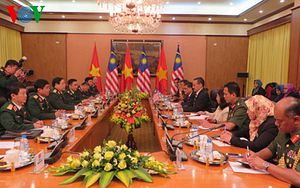Last week, Malaysia’s navy chief embarked on a visit to Vietnam. The trip, along with the meetings held between officials on both sides, once again put the focus on continuing efforts by the two Southeast Asian states to explore opportunities to broaden and deepen their bilateral defense cooperation, following the election of a new government in Malaysia.
As I have noted before in these pages, Vietnam and Malaysia share a relationship that extends into the defense realm, with both countries inking a memorandum of understanding (MOU) on bilateral defense cooperation back in 2008. The scope of ties includes not only issues that make the headlines like the South China Sea – both countries are claimants – but also others such as countering transnational crimes, managing illegal fishing, and sharing experience on peacekeeping, which Hanoi is looking to play a bigger role in (See: “China-Vietnam South China Sea Spat in the Spotlight”).
Though some advances have been made in bilateral defense ties over the years, including the signing of a letter of intent in 2015 and an agreement to establish a High Level Committee (HLC) to structure defense, in some areas the pace has been slower than the rhetoric has suggested. 2018 offers an opportunity for both sides to further boost defense ties in this respect, with it marking the 45th anniversary of bilateral diplomatic ties as well as the 10th anniversary of the original MOU on defense cooperation.
Last week, the naval aspect of the defense relationship was in the spotlight again when Malaysia’s navy chief Admiral Ahmad Kamarulzaman Ahmad Badaruddin visited Vietnam. The visit was the first high-level bilateral defense interaction between the two countries in this area since a new Malaysian government won a shock election in May, displacing the Barisan Nasional coalition which has governed the country since independence and putting the country’s longest-serving prime minister Mahathir Mohamad back into office once again (See: “What Does Malaysia’s Shock Election Result Mean for its Future?”).
The working visit of the navy chief and his delegation included meetings at Vietnam’s defense ministry in Hanoi as well as the Vietnam People’s Navy in Hai Phong. They met with a range of officials including Lieutenant General Phan Van Giang, who is deputy defense minister, and Vice Admiral Pham Hoai Nam, who is the commander of the Vietnam People’s Navy.
During the interactions, as with previous engagements of this ilk, both sides reviewed the state of their bilateral ties and also discussed ways to advance them in the future. Few details were publicly released, but official Vietnamese accounts said areas such as delegation exchanges and naval cooperation were discussed. The framework of the HLC and working groups as well as these interactions have provided both sides with opportunities to explore collaboration in a series of other areas as well including maintenance repair and overhaul (MRO) and logistical support.
One of the interesting opportunities both sides discussed on the naval side, according to Vietnam’s defense ministry, was the idea of Vietnamese submarine units visiting Malaysia as part of an exchange with their Malaysian counterparts. Though Vietnam operates Russian submarines and Malaysia has French submarines, the conversation as portrayed was more around the sharing of experiences rather than concrete defense cooperation (See: “When Will Malaysia Get New Submarines?”).
Few specifics were provided, both sides agreed to consider how to proceed following the inking of agreements between their governments and defense ministries. But as with naval ties and defense collaboration more generally, this will remain a space to watch as both countries try to advance cooperation during a significant year following a change of government on one side.

































